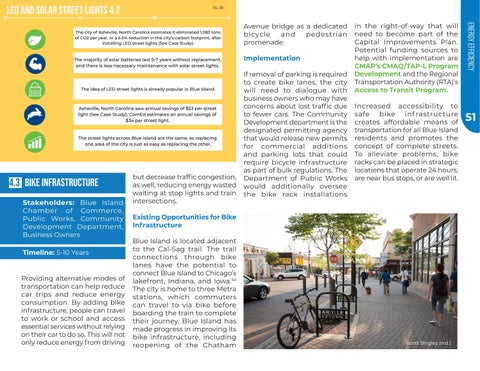55, 56
Implementation
4.3 Bike Infrastructure Stakeholders: Blue Island Chamber of Commerce, Public Works, Community Development Department, Business Owners Timeline: 5-10 Years
Providing alternative modes of transportation can help reduce car trips and reduce energy consumption. By adding bike infrastructure, people can travel to work or school and access essential services without relying on their car to do so. This will not only reduce energy from driving
but decrease traffic congestion, as well, reducing energy wasted waiting at stop lights and train intersections.
If removal of parking is required to create bike lanes, the city will need to dialogue with business owners who may have concerns about lost traffic due to fewer cars. The Community Development department is the designated permitting agency that would release new permits for commercial additions and parking lots that could require bicycle infrastructure as part of bulk regulations. The Department of Public Works would additionally oversee the bike rack installations
in the right-of-way that will need to become part of the Capital Improvements Plan. Potential funding sources to help with implementation are CMAP’s CMAQ/TAP-L Program Development and the Regional Transportation Authority (RTA)’s Access to Transit Program. Increased accessibility to safe bike inf rastructure creates affordable means of transportation for all Blue Island residents and promotes the concept of complete streets. To alleviate problems, bike racks can be placed in strategic locations that operate 24 hours, are near bus stops, or are well lit.
Existing Opportunities for Bike Infrastructure Blue Island is located adjacent to the Cal-Sag trail. The trail connections through bike lanes have the potential to connect Blue Island to Chicago’s lakefront, Indiana, and Iowa.54 The city is home to three Metra stations, which commuters can travel to via bike before boarding the train to complete their journey. Blue Island has made progress in improving its bike infrastructure, including reopening of the Chatham
Scott Shigley (n.d.)
ENERGY EFFICIENCY
Avenue bridge as a dedicated bicycle and pedestrian promenade.
51


























